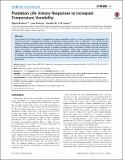Predation life history responses to increased temperature variability
Abstract
The evolution of life history traits is regulated by energy expenditure, which is, in turn, governed by temperature. The forecasted increase in temperature variability is expected to impose greater stress to organisms, in turn influencing the balance of energy expenditure and consequently life history responses. Here we examine how increased temperature variability affects life history responses to predation. Individuals reared under constant temperatures responded to different levels of predation risk as appropriate: namely, by producing greater number of neonates of smaller sizes and reducing the time to first brood. In contrast, we detected no response to predation regime when temperature was more variable. In addition, population growth rate was slowest among individuals reared under variable temperatures. Increased temperature variability also affected the development of inducible defenses. The combined effects of failing to respond to predation risk, slower growth rate and the miss-match development of morphological defenses supports suggestions that increased variability in temperature poses a greater risk for species adaptation than that posed by a mean shift in temperature.
Citation
Barbosa , M , Pestana , J & Soares , A M V M 2014 , ' Predation life history responses to increased temperature variability ' , PLoS ONE , vol. 9 , no. 9 , e107971 . https://doi.org/10.1371/journal.pone.0107971
Publication
PLoS ONE
Status
Peer reviewed
ISSN
1932-6203Type
Journal article
Description
This study was funded by a Postdoctoral fellowship to MB (SFRH/BPD/82259/2011) Fundacao para a Ciencia e Tecnologia (www.fct.pt/index.phtml.pt) and with a ‘‘Bolsista CAPES/BRASIL’’, (Project A058/2013) to AMVMS.Collections
Items in the St Andrews Research Repository are protected by copyright, with all rights reserved, unless otherwise indicated.

